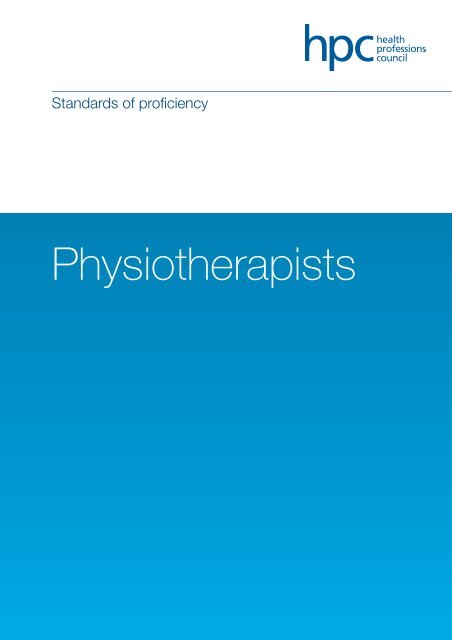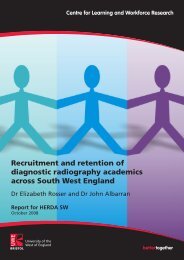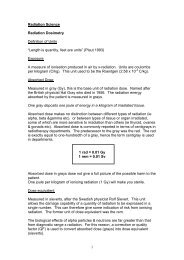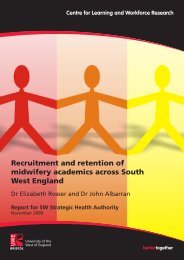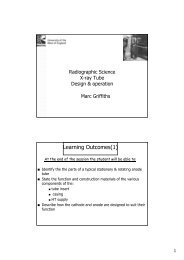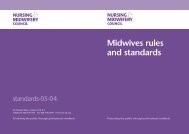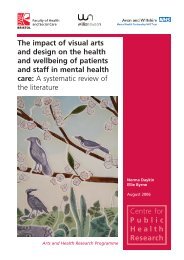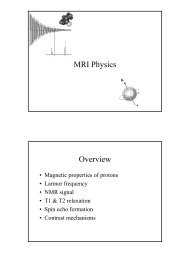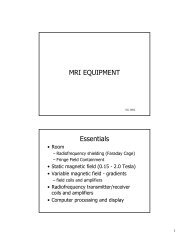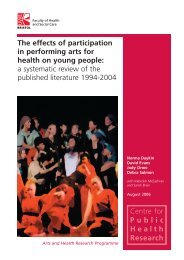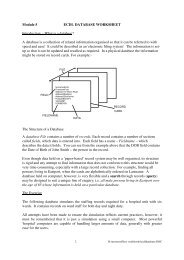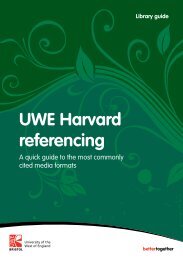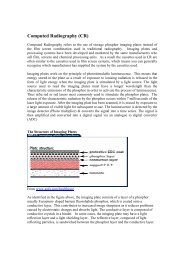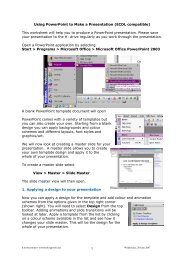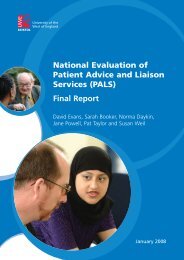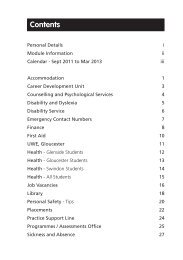Standards of proficiency – Physiotherapists
Standards of proficiency – Physiotherapists
Standards of proficiency – Physiotherapists
Create successful ePaper yourself
Turn your PDF publications into a flip-book with our unique Google optimized e-Paper software.
<strong>Standards</strong> <strong>of</strong> pr<strong>of</strong>iciency<br />
<strong>Physiotherapists</strong>
Contents<br />
Foreword 1<br />
Introduction 2<br />
Expectations <strong>of</strong> a health pr<strong>of</strong>essional 5<br />
The skills required for the application<br />
<strong>of</strong> practice 8<br />
Knowledge, understanding and skills 12
Foreword<br />
I am pleased to present the Health Pr<strong>of</strong>essions Council’s<br />
standards <strong>of</strong> pr<strong>of</strong>iciency.<br />
We first published the standards <strong>of</strong> pr<strong>of</strong>iciency when our Register<br />
opened in July 2003. We began to review them in October 2005<br />
to look at how they were working and to check whether they<br />
continued to reflect current practice as experienced by<br />
registrants, employers, educators and others. The review was<br />
led by a pr<strong>of</strong>essional liaison group (PLG), which included<br />
members <strong>of</strong> our Council, as well as representatives from<br />
pr<strong>of</strong>essional bodies and patient groups. We also held a formal<br />
consultation on the draft proposed standards. The review process<br />
and consultation produced extremely valuable feedback and we<br />
are grateful to all those who gave their time to help us in shaping<br />
the standards that follow.<br />
We made a small number <strong>of</strong> changes to the previous standards,<br />
mainly to reflect developments in education, to clarify our<br />
intentions and to correct any errors or omissions. We also revised<br />
the introduction to explain more clearly the purpose behind the<br />
standards, especially in relation to registrants who specialise or<br />
move into non-clinical areas <strong>of</strong> practice.<br />
I am confident that the standards are both fit for purpose and<br />
reflect current thinking in relation to safe pr<strong>of</strong>essional practice<br />
across the pr<strong>of</strong>essions.<br />
These standards are effective from 1 November 2007.<br />
Anna van der Gaag<br />
President<br />
<strong>Standards</strong> <strong>of</strong> pr<strong>of</strong>iciency – <strong>Physiotherapists</strong> 1
Introduction<br />
This document sets out the standards <strong>of</strong> pr<strong>of</strong>iciency. These<br />
are the standards we have produced for the safe and effective<br />
practice <strong>of</strong> the pr<strong>of</strong>essions we regulate. They are the minimum<br />
standards we consider necessary to protect members <strong>of</strong> the public.<br />
You must meet these standards when you first become<br />
registered. After that, every time you renew your registration you<br />
will be asked to sign a declaration that you continue to meet the<br />
standards <strong>of</strong> pr<strong>of</strong>iciency that apply to your scope <strong>of</strong> practice.<br />
We also expect you to keep to our standards <strong>of</strong> conduct,<br />
performance and ethics, which are published in a separate<br />
document.<br />
The standards <strong>of</strong> pr<strong>of</strong>iciency in this document include both generic<br />
elements, which apply to all our registrants, and pr<strong>of</strong>ession-specific<br />
elements that are relevant to registrants belonging to one <strong>of</strong> the<br />
pr<strong>of</strong>essions we currently regulate. The generic standards are<br />
written in black, and the pr<strong>of</strong>ession-specific standards are<br />
written in blue to help you distinguish between them.<br />
The generic standards explain the key obligations that we expect <strong>of</strong><br />
you. Occasionally, we have pointed out specific elements <strong>of</strong> those<br />
key obligations. We have not attempted to create exhaustive lists <strong>of</strong><br />
all the areas that each generic standard covers; we have simply<br />
highlighted specific elements where we consider this to be helpful.<br />
A note about our expectations <strong>of</strong> you<br />
The standards <strong>of</strong> pr<strong>of</strong>iciency play a central role in how you can<br />
gain admission to, and remain on, the Register and thereby gain<br />
the right to use the protected title(s) <strong>of</strong> your pr<strong>of</strong>ession.<br />
It is important that you read and understand this document. If<br />
your practice is called into question we will consider these<br />
standards (and our standards <strong>of</strong> conduct, performance and<br />
ethics) in deciding what action, if any, we need to take.<br />
The standards set out in this document complement information<br />
and guidance issued by other organisations, such as your<br />
pr<strong>of</strong>essional body or your employer.<br />
2<br />
<strong>Standards</strong> <strong>of</strong> pr<strong>of</strong>iciency – <strong>Physiotherapists</strong>
Your scope <strong>of</strong> practice<br />
Your scope <strong>of</strong> practice is the area or areas <strong>of</strong> your pr<strong>of</strong>ession in<br />
which you have the knowledge, skills and experience to practise<br />
lawfully, safely and effectively, in a way that meets our standards<br />
and does not pose any danger to the public or to yourself.<br />
We recognise that a registrant’s scope <strong>of</strong> practice will change<br />
over time and that the practice <strong>of</strong> experienced registrants <strong>of</strong>ten<br />
becomes more focused and specialised than that <strong>of</strong> newly<br />
registered colleagues. This might be because <strong>of</strong> specialisation in a<br />
certain clinical area or with a particular client group, or a<br />
movement into roles in management, education or research.<br />
Your particular scope <strong>of</strong> practice may mean that you are<br />
unable to continue to demonstrate that you meet all <strong>of</strong><br />
the standards that apply for the whole <strong>of</strong> your pr<strong>of</strong>ession.<br />
As long as you make sure that you are practising safely and<br />
effectively within your given scope <strong>of</strong> practice and do not practise in<br />
the areas where you are not pr<strong>of</strong>icient to do so, this will not be a<br />
problem. If you want to move outside <strong>of</strong> your scope <strong>of</strong> practice you<br />
should be certain that you are capable <strong>of</strong> working lawfully, safely<br />
and effectively. This means that you need to exercise personal<br />
judgement by undertaking any necessary training and experience.<br />
Meeting the standards<br />
It is important that our registrants meet our standards and are<br />
able to practise lawfully, safely and effectively. However, we don’t<br />
dictate how you should meet our standards. There is normally<br />
more than one way in which each standard can be met and the<br />
way in which you meet our standards might change over time<br />
because <strong>of</strong> improvements in technology or changes in your<br />
practice. As an autonomous pr<strong>of</strong>essional you need to make<br />
informed, reasoned decisions about your practice to ensure that<br />
you meet the standards that apply to you. This includes seeking<br />
advice and support from education providers, employers,<br />
colleagues and others to ensure that the wellbeing <strong>of</strong> service<br />
users is safeguarded at all times.<br />
<strong>Standards</strong> <strong>of</strong> pr<strong>of</strong>iciency – <strong>Physiotherapists</strong> 3
In particular, we recognise the valuable role played by pr<strong>of</strong>essional<br />
bodies in representing and promoting the interests <strong>of</strong> their members.<br />
This <strong>of</strong>ten includes guidance and advice about good practice which<br />
can help you meet the standards laid out in this document.<br />
Service users<br />
We recognise that our registrants work in a range <strong>of</strong> different<br />
settings, which include clinical practice, education, research and<br />
roles in industry. We recognise that different pr<strong>of</strong>essions<br />
sometimes use different terms to refer to those who use or who<br />
are affected by their practice and that the use <strong>of</strong> terminology can<br />
be an emotive issue.<br />
We have tried to use a term in the generic standards which is as<br />
inclusive as possible. Throughout the generic standards we have<br />
used the term ‘service users’ to refer to anyone who uses or is<br />
affected by the services <strong>of</strong> registrants. Who your service users are<br />
will depend on how and where you work. For example, if you work<br />
in clinical practice, your service users might be your patients or your<br />
staff if you manage a team. The term also includes other people<br />
who might be affected by your practice, such as carers and<br />
relatives. In the pr<strong>of</strong>ession-specific standards, we have retained the<br />
terminology which is relevant to each individual pr<strong>of</strong>ession.<br />
These standards may change in the future<br />
We have produced this new version <strong>of</strong> our standards after<br />
speaking to our stakeholders about how the standards were<br />
working and how relevant they were to registrants’ practice.<br />
We will continue to listen to our stakeholders and will keep our<br />
standards under continual review. So we may make further<br />
changes in the future to take into account changes in practice.<br />
We will always publicise any changes to the standards that we<br />
make by, for instance, publishing notices on our website and<br />
informing pr<strong>of</strong>essional bodies.<br />
4<br />
<strong>Standards</strong> <strong>of</strong> pr<strong>of</strong>iciency – <strong>Physiotherapists</strong>
Expectations <strong>of</strong> a health<br />
pr<strong>of</strong>essional<br />
1a<br />
Pr<strong>of</strong>essional autonomy and accountability<br />
Registrant physiotherapists must:<br />
1a.1 be able to practise within the legal and ethical<br />
boundaries <strong>of</strong> their pr<strong>of</strong>ession<br />
– understand the need to act in the best interests <strong>of</strong> service users<br />
at all times<br />
– understand what is required <strong>of</strong> them by the Health Pr<strong>of</strong>essions<br />
Council<br />
– understand the need to respect, and so far as possible uphold,<br />
the rights, dignity, values and autonomy <strong>of</strong> every service user<br />
including their role in the diagnostic and therapeutic process and<br />
in maintaining health and wellbeing<br />
– be aware <strong>of</strong> current UK legislation applicable to the work <strong>of</strong> their<br />
pr<strong>of</strong>ession<br />
1a.2 be able to practise in a non-discriminatory manner<br />
1a.3 understand the importance <strong>of</strong> and be able to maintain<br />
confidentiality<br />
1a.4 understand the importance <strong>of</strong> and be able to obtain<br />
informed consent<br />
1a.5 be able to exercise a pr<strong>of</strong>essional duty <strong>of</strong> care<br />
1a.6 be able to practise as an autonomous pr<strong>of</strong>essional,<br />
exercising their own pr<strong>of</strong>essional judgement<br />
– be able to assess a situation, determine the nature and severity <strong>of</strong><br />
the problem and call upon the required knowledge and<br />
experience to deal with the problem<br />
– be able to initiate resolution <strong>of</strong> problems and be able to exercise<br />
personal initiative<br />
– know the limits <strong>of</strong> their practice and when to seek advice or refer<br />
to another pr<strong>of</strong>essional<br />
<strong>Standards</strong> <strong>of</strong> pr<strong>of</strong>iciency – <strong>Physiotherapists</strong> 5
– recognise that they are personally responsible for and must be<br />
able to justify their decisions<br />
1a.7 recognise the need for effective self-management <strong>of</strong><br />
workload and resources and be able to practise<br />
accordingly<br />
1a.8 understand the obligation to maintain fitness to practise<br />
– understand the need to practise safely and effectively within their<br />
scope <strong>of</strong> practice<br />
– understand the need to maintain high standards <strong>of</strong> personal conduct<br />
– understand the importance <strong>of</strong> maintaining their own health<br />
– understand both the need to keep skills and knowledge up to<br />
date and the importance <strong>of</strong> career-long learning<br />
1b<br />
Pr<strong>of</strong>essional relationships<br />
Registrant physiotherapists must:<br />
1b.1 be able to work, where appropriate, in partnership with<br />
other pr<strong>of</strong>essionals, support staff, service users and<br />
their relatives and carers<br />
– understand the need to build and sustain pr<strong>of</strong>essional relationships<br />
as both an independent practitioner and collaboratively as a<br />
member <strong>of</strong> a team<br />
– understand the need to engage service users and carers in<br />
planning and evaluating diagnostics, treatments and interventions<br />
to meet their needs and goals<br />
– be able to make appropriate referrals<br />
– understand the structure and function <strong>of</strong> health, education and<br />
social care services in the UK and current developments, and be<br />
able to respond appropriately<br />
1b.2 be able to contribute effectively to work undertaken as<br />
part <strong>of</strong> a multi-disciplinary team<br />
1b.3 be able to demonstrate effective and appropriate skills<br />
in communicating information, advice, instruction and<br />
6<br />
<strong>Standards</strong> <strong>of</strong> pr<strong>of</strong>iciency – <strong>Physiotherapists</strong>
pr<strong>of</strong>essional opinion to colleagues, service users, their<br />
relatives and carers<br />
– be able to communicate in English to the standard equivalent to<br />
level 7 <strong>of</strong> the International English Language Testing System, with<br />
no element below 6.5 1<br />
– understand how communication skills affect the assessment <strong>of</strong><br />
service users and how the means <strong>of</strong> communication should be<br />
modified to address and take account <strong>of</strong> factors such as age,<br />
physical ability and learning ability<br />
– be able to select, move between and use appropriate forms <strong>of</strong><br />
verbal and non-verbal communication with service users and others<br />
– be aware <strong>of</strong> the characteristics and consequences <strong>of</strong> non-verbal<br />
communication and how this can be affected by culture, age,<br />
ethnicity, gender, religious beliefs and socio-economic status<br />
– understand the need to provide service users (or people acting on<br />
their behalf) with the information necessary to enable them to<br />
make informed decisions<br />
– understand the need to use an appropriate interpreter to assist<br />
service users whose first language is not English, wherever possible<br />
– recognise that relationships with service users should be based<br />
on mutual respect and trust, and be able to maintain high<br />
standards <strong>of</strong> care even in situations <strong>of</strong> personal incompatibility<br />
1b.4 understand the need for effective communication<br />
throughout the care <strong>of</strong> the service user<br />
– recognise the need to use interpersonal skills to encourage the<br />
active participation <strong>of</strong> service users<br />
1<br />
The International English Language Testing System (IELTS) tests competence in spoken and<br />
written English. Applicants who have qualified outside <strong>of</strong> the UK, whose first language is not<br />
English and who are not nationals <strong>of</strong> a country within the European Economic Area (EEA), have<br />
to provide evidence that they have reached the necessary standard. We accept a number <strong>of</strong><br />
other tests as equivalent to the IELTS examination. Please visit our website for more information.<br />
<strong>Standards</strong> <strong>of</strong> pr<strong>of</strong>iciency – <strong>Physiotherapists</strong> 7
2a<br />
Identification and assessment <strong>of</strong> health and<br />
social care needs<br />
Registrant physiotherapists must:<br />
2a.1 be able to gather appropriate information<br />
2a.2 be able to select and use appropriate assessment<br />
techniques<br />
– be able to undertake and record a thorough, sensitive and detailed<br />
assessment, using appropriate techniques and equipment<br />
– be able to recognise the need to identify and take account <strong>of</strong> the<br />
physical, psychological, social and cultural needs <strong>of</strong> individuals<br />
and communities during the assessment process<br />
2a.3 be able to undertake or arrange investigations as<br />
appropriate<br />
2a.4 be able to analyse and critically evaluate the<br />
information collected<br />
2b<br />
The skills required for the<br />
application <strong>of</strong> practice<br />
Formulation and delivery <strong>of</strong> plans and<br />
strategies for meeting health and social care<br />
needs<br />
Registrant physiotherapists must:<br />
2b.1 be able to use research, reasoning and problem-solving<br />
skills to determine appropriate actions<br />
– recognise the value <strong>of</strong> research to the critical evaluation <strong>of</strong> practice<br />
– be able to engage in evidence-based practice, evaluate practice<br />
systematically and participate in audit procedures<br />
– be aware <strong>of</strong> a range <strong>of</strong> research methodologies<br />
– be able to demonstrate a logical and systematic approach to<br />
problem solving<br />
– be able to evaluate research and other evidence to inform their<br />
own practice<br />
– recognise the need to discuss, and be able to explain the<br />
8<br />
<strong>Standards</strong> <strong>of</strong> pr<strong>of</strong>iciency – <strong>Physiotherapists</strong>
ationale for, the use <strong>of</strong> physiotherapy interventions<br />
– be able to form a diagnosis on the basis <strong>of</strong> physiotherapy<br />
assessment<br />
2b.2 be able to draw on appropriate knowledge and skills in<br />
order to make pr<strong>of</strong>essional judgements<br />
– be able to change their practice as needed to take account <strong>of</strong><br />
new developments<br />
– be able to demonstrate a level <strong>of</strong> skill in the use <strong>of</strong> information<br />
technology appropriate to their practice<br />
2b.3 be able to formulate specific and appropriate<br />
management plans including the setting <strong>of</strong> timescales<br />
– understand the requirement to adapt practice to meet the needs<br />
<strong>of</strong> different groups distinguished by, for example, physical,<br />
psychological, environmental, cultural or socio-economic factors<br />
– be able to set goals and construct specific individual and group<br />
physiotherapy programmes<br />
– understand the need to agree the goals, priorities and methods <strong>of</strong><br />
physiotherapy intervention in partnership with the service user<br />
– be able to apply problem solving and clinical reasoning to<br />
assessment findings to plan and prioritise appropriate physiotherapy<br />
– be able to select, plan, implement and manage physiotherapy<br />
treatment aimed at the facilitation and restoration <strong>of</strong> movement<br />
and function<br />
2b.4 be able to conduct appropriate diagnostic or monitoring<br />
procedures, treatment, therapy or other actions safely<br />
and skilfully<br />
– understand the need to maintain the safety <strong>of</strong> both service users<br />
and those involved in their care<br />
– ensure service users are positioned (and if necessary immobilised)<br />
for safe and effective interventions<br />
– be able to deliver and evaluate physiotherapy programmes<br />
<strong>Standards</strong> <strong>of</strong> pr<strong>of</strong>iciency – <strong>Physiotherapists</strong> 9
– be able to select and apply safe and effective therapeutic<br />
exercise, manual therapy and electrotherapies in order to alleviate<br />
symptoms and restore optimum function<br />
– be able to use mobilisation, respiratory physiotherapy, neurotherapeutic<br />
handling and massage techniques<br />
– know and be able to apply the key concepts which are relevant to<br />
safe and effective practice as a supplementary prescriber in order<br />
to have their name annotated on the Register (this standard<br />
applies only to registrants who are eligible to have their names<br />
annotated on the Register)<br />
2b.5 be able to maintain records appropriately<br />
– be able to keep accurate, legible records and recognise the need<br />
to handle these records and all other information in accordance<br />
with applicable legislation, protocols and guidelines<br />
– understand the need to use only accepted terminology in making<br />
records<br />
2c<br />
Critical evaluation <strong>of</strong> the impact <strong>of</strong>, or<br />
response to, the registrant’s actions<br />
Registrant physiotherapists must:<br />
2c.1 be able to monitor and review the ongoing effectiveness<br />
<strong>of</strong> planned activity and modify it accordingly<br />
– be able to gather information, including qualitative and<br />
quantitative data, that helps to evaluate the responses <strong>of</strong> service<br />
users to their care<br />
– be able to evaluate intervention plans using recognised outcome<br />
measures and revise the plans as necessary in conjunction with<br />
the service user<br />
– recognise the need to monitor and evaluate the quality <strong>of</strong> practice<br />
and the value <strong>of</strong> contributing to the generation <strong>of</strong> data for quality<br />
assurance and improvement programmes<br />
– be able to make reasoned decisions to initiate, continue, modify<br />
or cease treatment or the use <strong>of</strong> techniques or procedures, and<br />
10<br />
<strong>Standards</strong> <strong>of</strong> pr<strong>of</strong>iciency – <strong>Physiotherapists</strong>
ecord the decisions and reasoning appropriately<br />
– be able to evaluate treatment plans to ensure that they meet the<br />
physiotherapy needs <strong>of</strong> service users, informed by changes in<br />
circumstances and health status<br />
2c.2 be able to audit, reflect on and review practice<br />
– understand the principles <strong>of</strong> quality control and quality assurance<br />
– be aware <strong>of</strong> the role <strong>of</strong> audit and review in quality management,<br />
including quality control, quality assurance and the use <strong>of</strong><br />
appropriate outcome measures<br />
– be able to maintain an effective audit trail and work towards<br />
continual improvement<br />
– participate in quality assurance programmes, where appropriate<br />
– understand the value <strong>of</strong> reflection on practice and the need to<br />
record the outcome <strong>of</strong> such reflection<br />
– recognise the value <strong>of</strong> case conferences and other methods <strong>of</strong><br />
review<br />
<strong>Standards</strong> <strong>of</strong> pr<strong>of</strong>iciency – <strong>Physiotherapists</strong> 11
3a<br />
Knowledge, understanding<br />
and skills<br />
Knowledge, understanding and skills<br />
Registrant physiotherapists must:<br />
3a.1 know and understand the key concepts <strong>of</strong> the bodies <strong>of</strong><br />
knowledge which are relevant to their pr<strong>of</strong>essionspecific<br />
practice<br />
– understand the structure and function <strong>of</strong> the human body,<br />
relevant to their practice, together with knowledge <strong>of</strong> health,<br />
disease, disorder and dysfunction<br />
– be aware <strong>of</strong> the principles and applications <strong>of</strong> scientific enquiry,<br />
including the evaluation <strong>of</strong> treatment efficacy and the research<br />
process<br />
– recognise the role <strong>of</strong> other pr<strong>of</strong>essions in health and social care<br />
– understand the theoretical basis <strong>of</strong>, and the variety <strong>of</strong> approaches<br />
to, assessment and intervention<br />
– understand the following aspects <strong>of</strong> biological science:<br />
– normal human anatomy and physiology, especially the dynamic<br />
relationships <strong>of</strong> human structure and function and the<br />
neuromuscular, musculoskeletal, cardio-vascular and respiratory systems<br />
– patterns <strong>of</strong> human growth and development across the lifespan<br />
– factors influencing individual variations in human ability and<br />
health status<br />
– how the application <strong>of</strong> physiotherapy can cause physiological<br />
and structural change<br />
– understand the following aspects <strong>of</strong> physical science:<br />
– the principles and theories from physics, biomechanics, applied<br />
exercise science and ergonomics that can be applied to<br />
physiotherapy<br />
– the means by which the physical sciences can inform the<br />
understanding and analysis <strong>of</strong> movement and function<br />
12<br />
<strong>Standards</strong> <strong>of</strong> pr<strong>of</strong>iciency – <strong>Physiotherapists</strong>
– the principles and application <strong>of</strong> measurement techniques<br />
based on biomechanics or electrophysiology<br />
– the application <strong>of</strong> anthropometric and ergonomic principles<br />
– understand the following aspects <strong>of</strong> clinical science:<br />
– pathological changes and related clinical features commonly<br />
encountered in physiotherapy practice<br />
– physiological, structural, behavioural and functional changes that<br />
can result from physiotherapy intervention and disease progression<br />
– the specific contribution that physiotherapy can potentially<br />
make to enhancing individuals’ functional ability, together with<br />
the evidence base for this<br />
– the different concepts and approaches that inform the<br />
development <strong>of</strong> physiotherapy interventions<br />
– understand the following aspects <strong>of</strong> behavioural science:<br />
– psychological, social and cultural factors that influence an<br />
individual in health and illness, including their responses to the<br />
management <strong>of</strong> their health status and related treatment<br />
– how psychology, sociology and cultural diversity inform an<br />
understanding <strong>of</strong> health, illness and health care in the context <strong>of</strong><br />
physiotherapy and the incorporation <strong>of</strong> this knowledge into<br />
physiotherapy practice<br />
– theories <strong>of</strong> communication relevant to effective interaction with<br />
service users, carers, colleagues, managers and other health<br />
and social care pr<strong>of</strong>essionals<br />
– theories <strong>of</strong> team working and leadership<br />
3a.2 know how pr<strong>of</strong>essional principles are expressed and<br />
translated into action through a number <strong>of</strong> different<br />
approaches to practice, and how to select or modify<br />
approaches to meet the needs <strong>of</strong> an individual, groups<br />
or communities<br />
<strong>Standards</strong> <strong>of</strong> pr<strong>of</strong>iciency – <strong>Physiotherapists</strong> 13
3a.3 understand the need to establish and maintain a safe<br />
practice environment<br />
– be aware <strong>of</strong> applicable health and safety legislation, and any<br />
relevant safety policies and procedures in force at the workplace,<br />
such as incident reporting, and be able to act in accordance with<br />
these<br />
– be able to work safely, including being able to select appropriate<br />
hazard control and risk management, reduction or elimination<br />
techniques in a safe manner in accordance with health and safety<br />
legislation<br />
– be able to select appropriate personal protective equipment and<br />
use it correctly<br />
– be able to establish safe environments for practice, which<br />
minimise risks to service users, those treating them, and others,<br />
including the use <strong>of</strong> hazard control and particularly infection<br />
control<br />
– know and be able to apply appropriate moving and handling<br />
techniques<br />
14<br />
<strong>Standards</strong> <strong>of</strong> pr<strong>of</strong>iciency – <strong>Physiotherapists</strong>
<strong>Standards</strong> <strong>of</strong> pr<strong>of</strong>iciency – <strong>Physiotherapists</strong> 15
16<br />
<strong>Standards</strong> <strong>of</strong> pr<strong>of</strong>iciency – <strong>Physiotherapists</strong>
Park House<br />
184 Kennington Park Road<br />
London SE11 4BU<br />
tel +44 (0)20 7582 0866<br />
fax +44 (0)20 7820 9684<br />
www.hpc-uk.org<br />
This document is available in<br />
alternative formats and Welsh<br />
on request.<br />
Call 020 7840 9806<br />
or email publications@hpc-uk.org<br />
Cert no. SGS-COC-00314<br />
© Health Pr<strong>of</strong>essions Council<br />
Publication code: 20070509jPOLPUB (printed October 2007)<br />
This document has been produced using trees from sustainable forests


